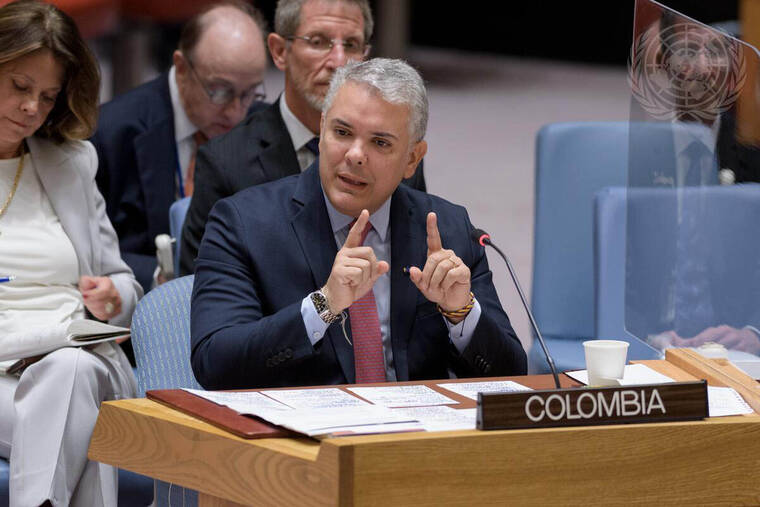Colombia’s leader touts peace efforts, says drugs are enemy
UNITED NATIONS — Speaking at the U.N. Security Council for the first time, outgoing Colombian President Ivan Duque on Tuesday touted his government’s accomplishments in building peace, including steps to reintegrate more than 12,800 former rebels into society, but he warned that drug trafficking remains the “greatest enemy” to achieving peace.
Duque said over 8,600 of the rebels who were “on the wrong track with weapons” are now involved in individual or collective projects that generate income involving producing, selling and marketing and are building a better life for their families.
He also cited new development plans for 14 territories that have led to more than $4 billion being invested in 70 municipalities encompassing more than 11,000 districts and millions of people, including 2 million who were victims of violence.
Duque took office in August 2018, less than two years after the November 2016 signing of a peace agreement between the government and the Revolutionary Armed Forces of Colombia, known as the FARC. It ended more than 50 years of war in Colombia that caused over 220,000 deaths and displaced nearly 6 million people.
An amnesty law was adopted covering most offenses committed by FARC fighters, but Duque said the constitution was reformed so drug trafficking and kidnapping connected to political crimes cannot be subject to an amnesty in the future.
During his four-year presidency, Duque said, the aggregate rate of homicides and kidnappings was lowered and economic reparations were paid to almost 400,000 victims, which he said “is also an unprecedented milestone.”
Speaking to the council ahead of Colombia’s May 29 presidential election, in which he isn’t a candidate, Duque said Colombia will defeat violence with justice and adherence to the law.
“It is also sad to see how the bloody hands of drug traffickers continue tearing apart some regions of Colombia,” Duque said. “Drug trafficking is a greatest enemy for peacebuilding in Colombia.”
He said the government has made efforts to eradicate and substitute crops, and last year saw the highest number of drug seizures — 670 tons. But he said drug production continues to increase, and if consuming countries don’t also share responsibility and adopt “more direct, clear public policies, it will continue to be a painful burden for the Colombian people.”
Carlos Ruiz Massieu, the U.N. special envoy for Colombia, agreed that progress is being made on the long-term successful reintegration of former FARC combatants, including most recently on providing land and housing.
“Nevertheless, the sustainability of the process is still contingent upon additional efforts, including to halt the violence that still jeopardizes former combatants’ plans to build a new life,” he said.
Violence has also increased in neglected regions including northern Arauca, where more than a hundred people have been killed and thousands displaced this year, Ruiz said. “Violence is exacting a particularly high toll on Indigenous and Afro-Colombian communities in the form of killings, displacement and the increasing recruitment of minors.”
Russian Ambassador Vassily Nebenzia lashed out at Duque, accusing him of failing to restore peace in Colombia. The sharp criticism followed Colombia’s support for two U.N. General Assembly resolutions demanding an immediate cease-fire in Ukraine, withdrawal of all Russian troops from the country and protection for civilians. Colombia also supported a resolution last week suspending Russia from the U.N.’s leading human rights body, the Geneva-based Human Rights Council.
Nebenzia said Russia’s concerns about implementing the 2016 peace agreement “are increasing each year.” Unfortunately, he said, national reconciliation hasn’t been attained, the government is unable to ensure the security of participants in the peace process and community leaders, and it hasn’t assumed authority in rural areas or successfully implemented agrarian reforms and crop substitution programs.
Taking the floor again at the end of the meeting, Duque called Russia’s invasion of Ukraine “simply insane” and “a genocide.” He urged the international community to condemn and isolate Russia and support the Ukrainian people.
As for Nebenzia’s criticism, Duque said, “I think it’s important that those who are hurting a country don’t preach about peace to the world, while acts of fratricide are being committed, and that we are all rejecting.”
Chris Lu, a U.S. deputy ambassador, echoed U.N. Secretary-General Antonio Guterres’ latest report saying Colombia continues to make “demonstrable progress” in efforts to implement the peace agreement, and he said the U.S. is encouraged that recent legislative elections took place with few disruptions.
Deputy French ambassador Nathalie Broadhurst called Colombia an example for the international community “in a world shaken by conflicts.”
“The peace agreement is gradually taking root and we hope that it will become irreversible,” she said. “Its full implementation is the best guarantee for this.”

